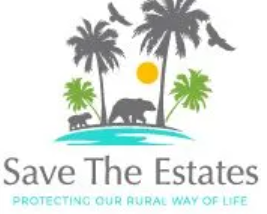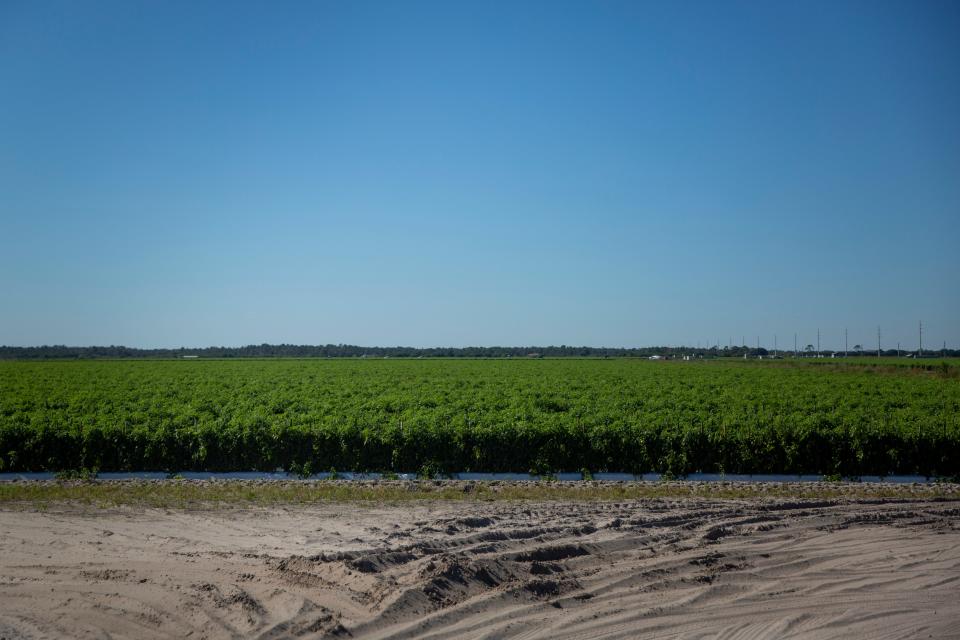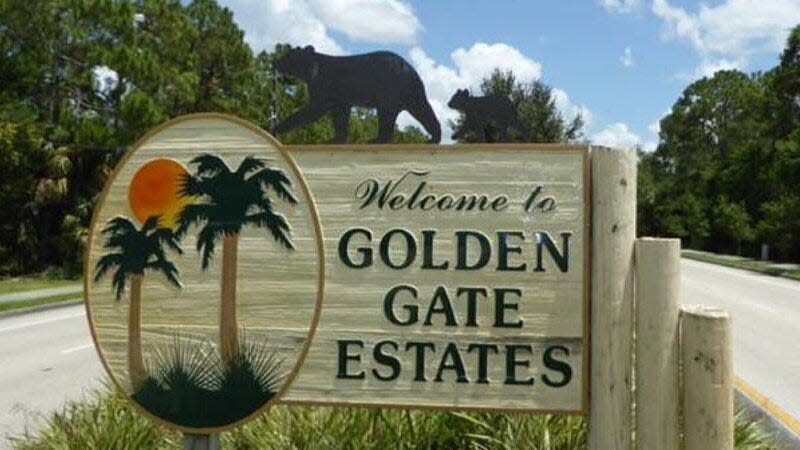Should Golden Gate Estates become a new town? Residents divided as some seek more control

A push to make Golden Gate Estates its own town, with its own rules, has proven difficult and divisive.
After years of discussion and study, the issue could soon come to a vote, with petitions circulating for and against incorporating – amid a feverish effort to get it on the ballot in 2024.
A grassroots committee, known as Save the Estates, is advocating for a town. It's an outgrowth of the Golden Gate Estates Area Civic Association.
What's behind the incorporation effort? That depends on who you ask and what side they're on.
Both sides accuse each other of intimidation and disinformation.
Among supporters there's a sense that Golden Gates Estates is not adequately represented by and often ignored by Collier County government, which makes decisions for them – and around them.
They are worried about overdevelopment, traffic congestion and pedestrian safety and they want better cell phone coverage, infrastructure and municipal services for working-class residents.
They're looking to protect their rural lifestyle and "oasis," from the onslaught of future development to the east, including a new town, and a string of new villages, off Oil Well Road, the county has approved since 2020.
"We are a mature community now. The community is starting to sense, since we are not incorporated, we are not taken seriously at the county commission," said Aaron Zwiefel, a co-chair of Save the Estates, and a vice president of the civic association.
As a town, the Estates would have a stronger, unified voice, and more control over its finances, including how its tax dollars are spent, he argued.
"We are not getting the funds back that we put into the county," Zwiefel added.
Opponents: 'A disaster in the making'
Resident Nadine Eubanks sees it much differently.
She expects more harm than good to come from incorporation. That's why she started a petition against it on change.org, which has more than 400 signatures, so far.
In her opener about the petition, she writes: "There is a small group trying to incorporate Golden Gate Estates. This is a disaster in the making. Do your research. Incorporating does nothing but jack your taxes under the guise of self-government. But all it is, is more control and more money and an additional layer of government. More taxes, less services is what it boils down to."
A petition in support of incorporation, created by Save the Estates, has circulated for months.
Asked how many signatures it had, Jill Rosenfeld, co-chair of Save the Estates, and a treasurer of the civic association, wouldn't share the number, but suggested there's enough to move the effort forward.
"We're doing very well," she said.
She acknowledged the issue of incorporation has become divisive in the community, making it harder to know the level of support, with some residents afraid to express their views, or even ask questions in fear of personal "attacks."
State Representative Laura Melo of Naples asked for a petition, as a way to gauge support, before deciding whether to sponsor a bill in favor of incorporation, which is required to advance it.

Study shows incorporation feasible
A feasibility study is one of the first steps the state requires for areas considering incorporation. The study must show that the new town or city can support itself financially.
The study for Golden Gate Estates, last updated in July, shows incorporation is feasible. However, it would require a property tax increase for the town to receive a percentage of the state sales and use taxes, and fuel taxes collected in the county, which would be one of its biggest revenue sources.
As its own town, the area could have received $4.2 million to $5.2 million in state taxes through revenue sharing last year.
To participate in revenue sharing, a city or town must have a property tax rate of 3 mills. One mill equates to $1 of tax for every $1,000 of assessed value.
As part of the larger unincorporated area, Estates residents now pay less than a mill for municipal services from the county (with a millage rate of 0.8069). They would pay 1.5 mills after incorporation, which in combination with the 1.5 they already pay the Greater Naples Fire District would total 3 mills, satisfying the requirement for revenue sharing.
"It would be kind of foolish not to raise the tax rate because you would be foregoing a lot of other revenue that you could get, if you don't do that," said Steven Bourassa, who conducted the feasibility study.
Bourassa, chairman of Florida Atlantic University's Department of Urban and Regional Planning, said the hardest part of the study was assessing how much revenue the town could expect to generate from property taxes. In the first year of collecting the taxes, he estimated they could range from a low of about $5.05 million to a high of more than $5.7 million.
By fiscal 2026, he forecast total revenue in the range of $13.3 million to $16.1 million. Initially, he expects the town's administrative costs to come in at less than $1.47 million, with minimal staff, and key services still provided by the county, or by outside contractors.
"In fact, there will be a significant surplus, based on revenues and expenses," Bourassa said.

The expected surplus has grown since the initial study, with property values increasing over the past year. In the eyes of supporters that makes it even more attractive.
"It looks fantastic," Zwiefel said. "The numbers actually make sense, and it would allow us to protect the community from future impacts of towns to the east of us."
A waiver required to incorporate
The community meets three of four standards to become a town.
Supporters seek a waiver from the state for the standard it doesn't meet – density.
State law requires an average density of 1.5 persons per acre to incorporate, but the density in the Estates is far less at 0.63 per acre. At build out, the community is expected to have more than 54,000 residents, with a density of about 1 person per acre.
Backers hope the state will see the waiver as justified. It has been granted before, most recently for Indiantown in Martin County, with a population of 6,000 when it incorporated in 2017.
"The whole point of us incorporating is to keep our low density," Rosenfeld said. "To keep the whole residential area the way it is now."
At this point, the mostly residential area is about 55% built out, she noted.
The area spans 53,500 acres, with 23,900 lots, mostly occupied by, or designated for single-family homes.
Tax increase necessary
If the town incorporates, residents on average would pay less than $200 more in property taxes in the first year of its collections, in exchange for gaining more control over local decisions, such as land use, planning and zoning, Rosenfeld said.
"We are trying to get the local issues addressed now," she said. "Not 20 years from now."
That includes the maintenance of local roads, with a goal of acting proactively, not reactively, to address and keep on top of community demands and needs, Rosenfeld said.
"We don't want it to be unaffordable for people," she said.
Rosenfeld joined the incorporation effort in December 2020, a few years after moving to the community. Others, such as Zwiefel, have been at it even longer.

Effort a 'personal deal'
"It has taken us a significant amount of time. We wanted to make sure it was absolutely concrete. That it would be feasible. We didn't want to put the community at risk," he said.
Opponents don't give a lot of credibility to the feasibility study, or the group that's pushing for incorporation. That includes long-time resident Mark Teeters, who said the civic association – under different leadership – voted against the idea many years ago before this latest effort surfaced.
He described the latest effort as a "personal deal," with the civic association's leadership unhappy about the county commission's actions of late, especially the actions of Bill McDaniel, who represents Golden Gate Estates.
"They don't like him, and they don't want anything to do with him anymore," Teeters said.
He sees the effort as unnecessary and doesn't want to pay more taxes, or deal with what he sees as just another layer of government, without benefit.
"At the end of the day, everybody is going to hurt here," he said. There are people on limited incomes."
The other side argues incorporation needs to be brought to a vote, so residents can make the choice, one way or the other.
"Everybody has got a right to vote," Zwiefel said. "That is all we are asking for, is the right to vote on the direction of the community."
Supporters plan to go before the Collier County legislative delegation in September in hopes of getting a thumbs up to move forward and a commitment by Rep. Melo to sponsor the bill necessary to do so. They hope to bring a referendum to voters in November 2024.
This article originally appeared on Naples Daily News: Golden Gate Estates residents want to form a new town to protect area

